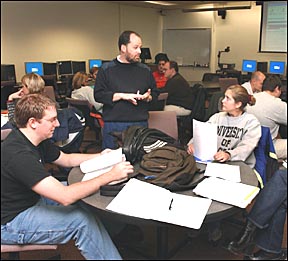|
|
|
|
|
November 8, 2002Non-tenure track faculty
|
 |
| James Gilchrist (standing, center) has a three-year contract under the new non-tenure-track faculty policy. Photo by Bob Elbert. |
James Gilchrist left a tenure-track position at Grand View College to take a non-tenure-track position this fall in Iowa State's English department.
"The academic and development opportunities at Iowa State, and the chance to teach a variety of courses, were important factors in my decision," Gilchrist said.
Of more importance, Gilchrist added, was the new non-tenure-track faculty policy that was implemented this fall. The policy provides job security and advancement opportunities for some who were hired in the past as temporary instructors.
"To me, it was important that there was some permanence to the position," said Gilchrist, who received a three-year contract. "Without it, I don't think I would have come to Iowa State. The opportunities are here for professional advancement. I think there's as much opportunity here to gain a permanent contract as there is to gain tenure."
Under the policy, non-tenure-track faculty fall under four titles: lecturer, clinician, senior lecturer and senior clinician. Lecturers and clinicians may receive up to three-year contracts, renewable for a total of six years. If they are promoted to senior positions, they may receive up to five-year contracts that can be renewed indefinitely.
Across the university, 232 faculty have been hired under the non-tenure-track faculty policy, said associate provost Susan Carlson. The highest concentrations are in the English, mathematics, and art and design departments. Most were hired as lecturers, but departments such as educational leadership and policy studies and veterinary clinical sciences also hired clinicians, Carlson said.
Ten faculty received three-year contracts in the English department. Another 12 have one-year contracts and 18 are on fall semester contracts, said David Roberts, departmental assistant chair who oversees the hiring process. Most contracts are full time, but some are part time. (Overall, 124 non-tenure-track faculty were hired on a full-time basis at the university, Carlson noted.)
All but seven of the lecturers in the English department previously had worked for the department as temporary instructors. As temporary instructors, they could work a total of six years full time, and then either had to move on or only work part time.
Most of the math department's 17 lecturers also previously taught in the department, but that may not be the case in the future. The policy was not approved until late spring, making it difficult to advertise in time to attract national candidates, said departmental chair Justin Peters.
Careful screening
The hiring process for fall semester was more intense this year than in the past, English department chair Charles Kostelnick and Peters agreed.
"Everyone had to apply from scratch," Kostelnick said. "They had to present the same materials as if they were applying for the first time."
"Our applicants were screened more carefully than before," Peters said. "The way it was done before worked poorly. I'm very supportive of the new policy. I see it as an improvement."
Kostelnick added, "In the past, the good teachers would have to leave after five years, or face a reduction in their teaching load. Now there's the prospect that they can stay with us."
The new policy calls for tenure-line faculty to select, review and renew non-tenure-track faculty appointments. That was not always the case in the past; sometimes temporary faculty were hired by department chairs with little or no input from the faculty.
Lecturers in the English department are hired to teach, and will not be required to publish or do research, Kostelnick said. But Gilchrist said, "I still plan to publish. I'm writing a book and I attend (professional) meetings and do service."
Peters said job descriptions among lecturers in the math department vary. He noted one lecturer asked to have research as part of his duties. Service is required for most lecturers, and can include duties such as serving on text book selection committees.
Percentage game
The policy limits non-tenure-track faculty to performing 25 percent of the instruction in departments and 15 percent of the instruction at the university overall.
Peters said lecturers make up slightly over 25 percent of the math department, which he calls "disturbing."
"This needs to be rectified," he said, adding he has received authorization to fill some tenure-track positions, which will lower the percentage.
"Although it's still a work in progress, we hope the faculty hired under this new policy will have better working conditions," Carlson said. "From the provost's office viewpoint, we're pleased these new positions exist. They will help the departments, particularly with their instructional needs."
Kostelnick is a self-professed advocate of the new policy.
"It's going to benefit everyone," Kostelnick added. "When lecturers are promoted to senior lecturers, the department will be more stable, undergraduate education will be better, and the senior lecturers will have a stronger investment in the program and job security. They'll feel a part of the program. It's a very great improvement."
Gilchrist echoes those sentiments. "I have a stronger sense of belonging. I feel like I have an impact on 302 (a business communication course). I'm part of the discussion on strategies and outcomes. I feel my experience is valued. There's a great feeling of ownership and contribution to the department."
|
Ames, Iowa 50011, (515) 294-4111 Published by: University Relations, online@iastate.edu Copyright © 1995-2001, Iowa State University. All rights reserved. |